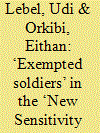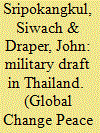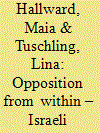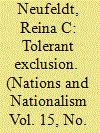| Srl | Item |
| 1 |
ID:
165741


|
|
|
|
|
| Summary/Abstract |
In recent decades (the ‗post-heroic‘ condition) - threats of widespread selective conscientious objection have become a political tool to advance opposing political agendas in Israel. This article examines attitudes amongst the Israeli public concerning the legitimacy of demands that different groups of soldiers be exempted from military operations to which they are ideologically opposed (such as serving in the occupied territories or, conversely, participating in evacuation of settlements). The results point to a multi-cultural model embracing diversity management not as a neo-liberal ideal but rather as a strategy for co-option, containment and inclusion, with a view to preserving the “people's army” model.
|
|
|
|
|
|
|
|
|
|
|
|
|
|
|
|
| 2 |
ID:
169169


|
|
|
|
|
| Summary/Abstract |
Thailand has had mandatory military service since 1905 and since 1954 via a lottery system. Beatings and deaths frequently occur among draftees, and photographs and videos in which draftees are injured, tortured, and humiliated are widespread. This article describes for the first time the development and nature of the Thai military draft. The authors analyse the military draft from a nonkilling global political science perspective and present a nonkilling rationale for ending the draft. The article argues that retaining the military draft promotes a killing society and violates human rights, including the right to conscientious objection; causes mental anguish; is inefficient economically; causes corruption; and supports military interventionism. The authors further maintain that physical abuse that has accompanied the Thai version of military conscription constitutes a pro-killing manifestation of the military regime’s approach to maintaining the existing institutional alignment and control in Glenn Paige’s ‘funnel of killing’. Instead, we recommend converting the draft to a national service program with civilian alternatives, together with conscientious objection as a right.
|
|
|
|
|
|
|
|
|
|
|
|
|
|
|
|
| 3 |
ID:
174603


|
|
|
|
|
| Summary/Abstract |
Protests in response to Israeli military action in the Occupied Territories have a long history in Israel. While such opposition movements in many countries are comprised of civil society activists, the dynamics of protest differ in Israel because of the country’s mandatory military service. From the 1980s to present day, former and current Israeli soldiers have used a wide range of methods, tactics, and strategies to challenge Israeli military actions. Using insights from nonviolent resistance theories, we examine how the approaches and goals of military opposition groups in Israel have changed over the past decades. Specifically, we develop a typology to explain why different types of protest arise from within the Israeli Defense Force that garner strong reactions – whether laudatory or derogatory – from the Israeli government and general public. The paper concludes with lessons learned for military opposition movements in the context of nonviolent resistance theory and practice.
|
|
|
|
|
|
|
|
|
|
|
|
|
|
|
|
| 4 |
ID:
086959


|
|
|
|
|
| Publication |
2009.
|
| Summary/Abstract |
During war, the demarcation 'enemy alien'- whether on ethnic or civic grounds - can lead to loss of political, social or economic rights. Yet not all minorities are excluded even though they pose problems for civic and ethnic national categories of belonging. This article explores the experiences of an ethno-religious minority who posed an intriguing dilemma for ethnic and civic categorisation in North America during World War II. The Mennonite experience enables a close examination of the relationship between a minority ethnic (and religious) group and majority concepts of wartime civic and ethnic nationalism. The article supports arguments that both ethnic and civic nationalism produce markers for the exclusion of minority groups during wartime. It reveals that minority groups can unintentionally become part of majority 'nationalisms' as the content of what defines the national ideal shifts over time. The experiences also suggest that a minority group can help mobilise symbolic resources that participate in transforming what defines the national ideal.
|
|
|
|
|
|
|
|
|
|
|
|
|
|
|
|